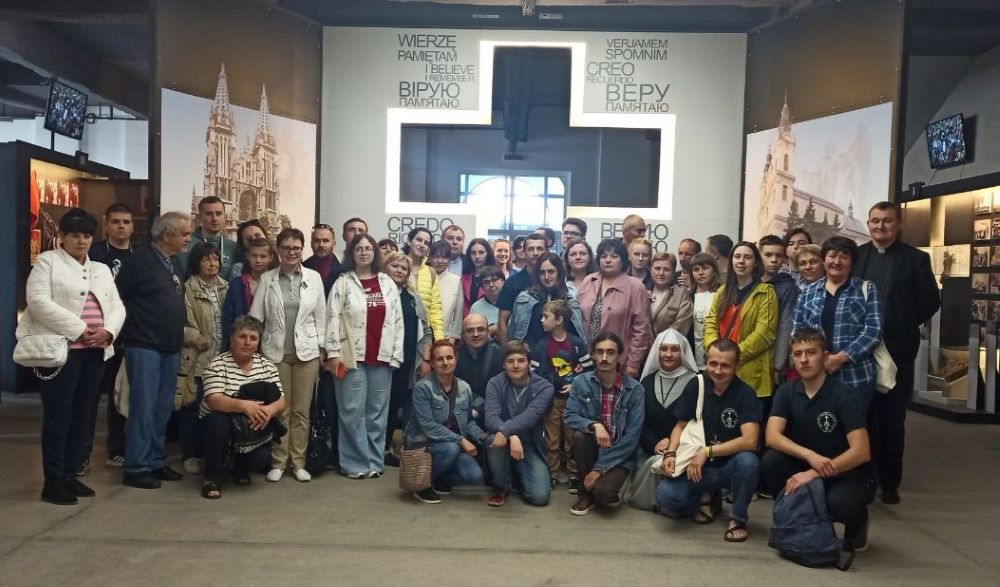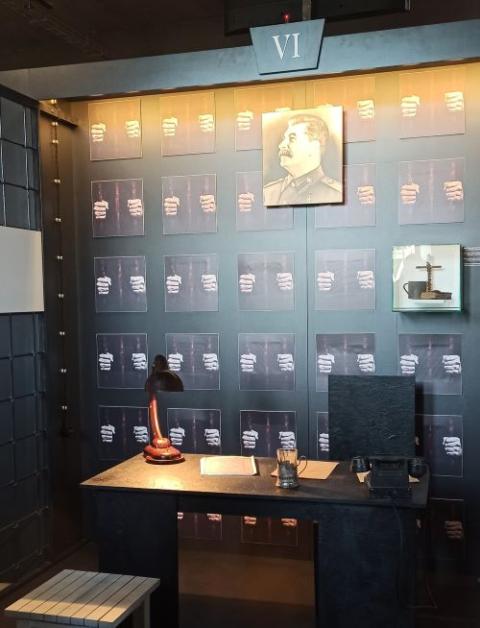
A group of students, teachers and employees of the Institute of Theological Sciences of the Immaculate Virgin Mary in Horodok, Ukraine stand in the Martyrs Memorial in the city of Tyvriv. (Courtesy of Iryna Saszko)
"Sanguis martyrum semen Ecclesiae" ("the blood of martyrs is the seed of the Church"). wrote the early Christian theologian Tertullian. The early Christians were convinced that by shedding their blood, they obtained the Holy Spirit for the faithful. It should be noted that Good Friday is closely related to Pentecost. After all, Jesus "gave up his spirit" (John 19:30) when he died. That is why on Good Friday, in memory of the martyrs and during the solemnity of Pentecost, Roman Catholic priests wear red vestments. It is a symbol that one cannot be a witness of faith ("martyr" is from the Greek word for "witness") and give one's life for, without the Holy Spirit.
The intellectual and spiritual formation of the students of the Institute of Theological Sciences of the Immaculate Virgin Mary in Horodok, Ukraine, helps them understand the suffering caused by the Russo-Ukrainian war. Daily fervent prayer for the Armed Forces of Ukraine, for the soldiers, the wounded, and the captives, as well as for the conversion of Russia, gives them hope that the Lord will restore the face of our land.
With these prayer intentions, on May 27, the day before the descent of the Holy Spirit (Pentecost), students, professors, staff, and internally displaced people living in our institute embarked on a pilgrimage to the city of Tyvriv, site of the only interactive Memorial of the Martyrs for the Faith of the 20th century in Eastern Europe.
Although we have been sleeping in the corridors, bathrooms and basements for almost a month because the enemy shells our cities and villages every night, we were filled with genuine divine joy. We nurtured hope and gratitude, even though the parents, brothers, husbands or friends of each of us are defending the country on the front lines. We were confident that our prayers, through the intercession of the innocent people killed during the reign of the communist regime, would obtain just peace for Ukraine from God.

This room at the Martyrs Memorial, Station VI, the room of interrogation and mental and physical abuse, highlights the Ukrainian people suffered at the hands of the Soviet Union. (Courtesy of Iryna Saszko)
The Memorial of the Martyrs for the Faith of the 20th Century is on the territory of the sanctuary of Our Lady in Tyvriv, under the care of the Missionaries of the Oblates of the Immaculate Virgin Mary. This unique museum consists of 14 rooms that symbolize the 14 Stations of the Cross of Jesus Christ. Each room represents different episodes of the lives of the martyrs, and a short film tells about their sufferings. From anti-religious propaganda in schools and the media, mockery of the liturgy, destruction of the institution of the family, the Holodomor, deportations, horrifying interrogations, punitive psychiatry, abuse in the Gulags, concentration camps, prison, mass executions — all of this could be heard from recordings of the words of those who experienced it. Each exhibit reminded us of the strength of spirit, unwavering faith, fervent love for Christ, and the church of brave men and women, priests and nuns, who showed steadfastness in the face of terrible tortures and did not renounce God.
The exhibit included a spectacle case where an arrested priest kept a piece of bread and a few raisins to celebrate the Eucharist under the cover of night. There were rosaries made from pieces of macaroni, breadcrumbs, or cherry stones since genuine ones were not available. We saw a rosary that the family buried in the ground after each prayer, so that during house searches, it would not be found by the Communist Secret Police. Broken figures of saints, pierced icons, prayer books, religious songs, and handwritten copies of evangelical texts by devout believers, as well as photographs of destroyed churches, empty homes, and executed people, show the conditions under which priests, monks and nuns had to carry out their pastoral ministry in the Ukrainian land.
Each room in the memorial has its own name. For example, the "House" room shows a rural Ukrainian hut with a cross on the wall, whose inhabitants were deported to Siberia and shot. The "Gift of Faith" room displays a desecrated altar, the site of the greatest sacrifice and love, while the "Cell of Death" room is an imitation of a place of torture and interrogations.
Advertisement
Our prayer in the dark rooms of the memorial lasted more than three hours, as we reflected on the suffering of Ukrainians during the 70 years of the Soviet Union's existence. Unfortunately, the Ukrainian people's Way of the Cross did not end with the collapse of the Communist regime. The successor of the USSR, the Russian Federation, is once again bombing our cities, deporting children, raping women and destroying churches. And the terrorist machine of the FSB (Russian Federal Security Service) tortures people in the occupied territories.
Back in 2001, during his pastoral visit to Ukraine, Pope John Paul II addressed the Ukrainian people with the words: "Ukrainian land, irrigated with the blood of martyrs, I thank you for the example of faithfulness to the Gospel that you have given to Christians in every part of the world!"
Today, I can confidently say that Ukraine is the land experiencing the most suffering on the European continent. However, the Good News lies in the fact that after the Way of the Cross of Jesus Christ, the dawn of Resurrection came.
The prayer in the memorial concludes in an illuminated room, where on a large cross, the word "Credo" is written in many languages of the world. And from all the monitors, joyful and triumphant, resounds: "Gloria in excelsis Deo!" We walked this path with torn hearts and teary eyes. However, the sacrifice of our ancestors has strengthened our faith in the fact that our suffering also has meaning. And in this bloody war, truth will surely prevail. With this conviction, we went to the church to celebrate the Eucharist on the vigil of Pentecost and with thirsty lips, we invoked the Holy Spirit.







